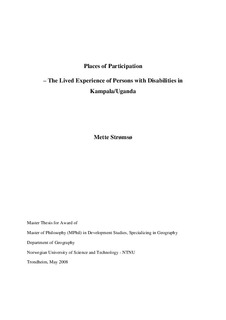Places of Participation: The Lived Experience of Persons with Disabilities in Kampala/Uganda
Master thesis
Permanent lenke
http://hdl.handle.net/11250/265246Utgivelsesdato
2008Metadata
Vis full innførselSamlinger
- Institutt for geografi [1097]
Sammendrag
This thesis explores the commonalities and differences of the lived experience of persons with disabilities (PWDs) in Kampala, Uganda. The endeavor of this study has been to create new references for understanding the lived experience of the embodied selves of PWDs. The thesis has identified various barriers and opportunities to participation for persons with visual and walking impairments in the mainstream society. Secondly, it has assessed how various agents at different levels of the society: macro, meso and micro negotiate access to participation for PWDs in Kampala. Finally, it has assessed how barriers are overcome in the everyday lives of PWDs, and also how it affects the lived experience of their embodied selves.
The theoretical framework that has been applied to this study is Giddens’ structuration theory and Agnew’s complementary approach to place; place as location, place as locale and place as sense of place. The analytical framework of this thesis is the social model of disability, although with modifications. The nature of this study is exploratory. The information collection consisted of self-selection of informants with four informal conversations, nine in-depth interviews, seven key informant interviews, and observation was as method applied throughout the fieldwork. However, limited understanding of the local context and culture, limited access to informants and a restricted selection of type of impairment are some of the methodological weaknesses of this study.
The study was conducted in Kampala. Kampala is an urban area creating particular barriers and opportunities for PWDs. However, most of Uganda’s population lives in rural areas representing other barriers and opportunities to participation. The political place of participation has to a large extent been opened for PWDs albeit the implementation of laws and policies is lacking behind. Despite the inclusion of PWDs, they need information about their rights, and they also need to feel themselves capable to participate. The negotiation of access to participation appears to focus upward in the hierarchy of power rather than down to the micro level, in particular in urban areas. It seems to be the norm rather than the exception for the PWD informants, at the micro level, to avoid or adapt to the hegemonic cultural power rather than to challenge it. Women with impairments are further down on the hierarchal pecking order than men. Within the sense of place, there are individual differences of tendencies of attribution, implying that some informants internalize external oppression while others appear to have more power from within. Hence, they have more power to challenge the hegemonic cultural power.
A major limitation to this study performed in a poor African country is that most of the literature applied is produced in a Western context which might result in a Eurocentric approach and understanding of disability in Kampala.
Key concepts: Commonalities, differences, structure, agency, places of participation, power, negotiation, embodiment, impairment, disability, intersectionality, lived experience.
